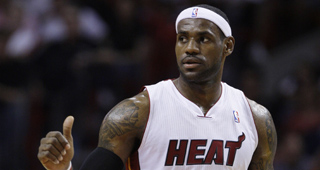The army is a team. It lives, eats, sleeps, fights as a team. This individuality stuff … is a bunch of c***. The bilious b******* who wrote that stuff about individuality for the Saturday Evening Post don’t know anything more about real battle than they do about fornicating.
-- George Patton on the eve of D-Day
Professional sports aren’t war. They are games, played by grown men, designed to keep children in shape. And although the language and imagery of war is used constantly to inform our understanding of sports, the most important lesson of organized warfare, as Patton tells it, is ignored.
Basketball is a team game. That’s what makes the NBA playoffs so great -- the best team almost always wins. Over the course of two months, a championship team has to win four best-of-seven series against dramatically different types of opponents. The team that survives that gauntlet is probably the best team in the league; VCU wouldn’t beat Kansas four out of seven times.
Yet too often our focus is on each team’s best player. It’s an easy narrative to graft onto a situation: will LeBron overcome his doubters in Miami? Will Dirk redeem himself after a history of playoff collapses? Is Kevin Durant ready to lead a team to a championship? Is Derrick Rose?
Star players, especially on the perimeter, have become NFL QB’s: they get too much credit and too much blame for their team’s performance. A basketball game is 5-on-5 not 1-on-1.
Both conference finals series are compelling match-ups between two good but flawed basketball teams.
The East will come down to Udonis Haslem: he is the only Miami center who can both protect the defensive glass and space the court offensively. When he’s not in, the Heat have to either sacrifice defense (Ilguaskas) or offense (Magloire, Anthony, Dampier) at the most important position on the floor.
The West will come down to Tyson Chandler: the Thunder can only score when they go small, when they are playing two big men they are effectively going 3-on-5, as their 29-point first half in Game 3 made clear. And because they have to keep one forward (either Collison or Ibaka) on Dirk, that leaves the 6’10 215 Kevin Durant trying to box-out Chandler.
But if Haslem, who is recovering from a serious foot injury, can’t sustain the level of play he gave Miami in Game 2, or if Chandler gets into foul trouble and can’t be as aggressive on the offensive glass, does anyone think those will be the stories out of Miami and Dallas?
While Durant and Rose are still too young for a narrative to develop around their careers, the Conference Finals have become a referendum on the personal characters of Dirk and LeBron.
Look no further than ESPN, where Ric Bucher and Chris Broussard were forced to debate this question: Who needs a title more -- Dirk or LeBron?
While both are indisputable first-ballot Hall of Famers, both wear the scarlet letters of never winning a title. As a result, their ultimate legacy is still to be decided. But should their careers be judged by the actions of Haslem and Chandler?
LeBron has played in over 700 regular season and NBA playoff games; Dirk has played in over 1,000. Do we really need more games to know how good they are as basketball players?
There is nothing magical about the playoffs; the rules, the rim and the court are the same. Winning a championship doesn’t reveal anything about the personal character of a player, and it doesn’t tell us all that much about how good they were at throwing a ball through a hoop.
In the trailer for “Bad Teacher”, one of the main characters -- played by Jason Segel -- gets in an argument with a young child about the merits of LeBron and Michael Jordan: “Call me when LeBron gets six rings … it’s the only argument I need!”
The joke being that even a child can see the absurdity of using team success to compare individual players. After all, how would a debate about Dirk and Kobe change if you switched their centers: Shawn Bradley for Shaq and Erick Dampier for Pau Gasol?
The reality is, no one, not even Michael Jordan, can win an NBA championship by himself. The way players are mythologized detracts rather than clarifies the action on the court -- ten men in tank-tops running around a hardwood floor working in concert to throw a spherical ball through a raised cylinder.
There’s nothing inherently wrong with mythology; it heightens the narrative stakes and dramatic tension of the games. Without it, there’s no inherent difference between watching an NBA game and a well-played pick-up game at the local gym.
There’s a reason parents give children a sweet dessert; it’s a reward for the more important, but less immediately satisfying, work of eating a nutritious meal. We shouldn’t get rid of the dessert, but we should remember that it’s the least important part of the meal.
After all, we didn’t give George Patton sole credit for D-Day; winning a battle, like winning a game, is a team effort.



